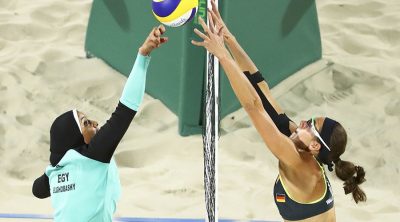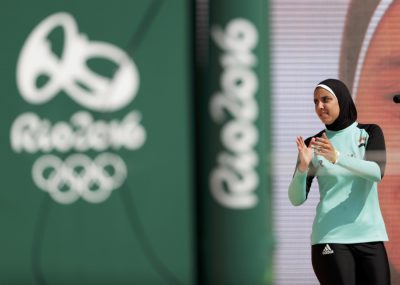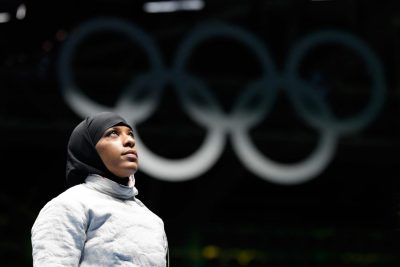Lucy Nicholson/Reuters
By
Ahmed Tharwat
The contrasting images of the fully clothed Egyptian women’s beach volleyball team playing the scantily clad German team was at the forefront of the media’s coverage as well as the internet during the Rio 2016 Olympics.
Sports uniforms, big business and mainly dominated by corporate sponsorship, suddenly transformed to a major cultural hot button on the beaches of Brazil. Watching women with skimpy bikinis and oily bodies playing beach volleyball has become a global spectacle and attracted millions of viewers. Sexism has always been a huge part of women’s sports, however only recently and in 2012 to be exact, the FIVB, International Volleyball Federation, announced, that it is no longer going to enforce the bikini wearing policy on women’s beach volleyball players. The thinking behind this was driven not by cultural or feminist pressure, but by the global appeal of volleyball in more non-western countries and the fear of losing the market and players who may have a different ideas and standards of how women should dress. As FIVB spokesman Richard Baker said, “we don’t think we will see much change…in uniform on the world tour.”
The Egyptian volleyball team however not only changed that at the Rio 2016 Olympics, but changed the conversation and debate about women’s dress and feminism. Muslim women’s body and soul were once again at the forefront of the international forefront. The west has been so fixated on Muslim women’s dress for a long time. France banned the wearing of hijabs in public schools and governments, in addition to the bur-kini, the long swimwear that some Muslim women wear at some beaches. As Arundhati Roy articulated, “coercing a woman out of the burka instead of enabling her to choose is an act of violence, humiliation and cultural imperialism.”
Doaa El-Ghobashy of Egypt competes in beach volleyball in a hijab – Ricardo Moraes/Reuters
The idea that Muslim women’s dress is reflexively a symbol of oppression and forced on Muslims is a very old medieval argument. The Telegraph, in one of its videos, you can see Syrian women burning their Burka after their town Manbij was liberated from ISIS. In the same video one woman held the burning Burka and chanted joyfully in Arabic, which the paper appeared to miss in its reporting. “May god burn their (ISIS) hearts as they had burned ours.” When the bikini sport uniform was forced on women players by the International Volleyball Federation, we didn’t see a feminist revolt or a bikini burning protest against the FIVB oppressors. Muslim women may burn the burka when it is a symbol of oppression and they may also wear it as a symbol of resistance to western colonisation and domination. To show their displeasure with the despotic military regime in Egypt, the burka acted as a symbol of resistance and protest against this regime, as much as is was a personal identity for Muslim women.
The Independent noted that the body-suit, (Hijab or otherwise), is not only worn for religious reasons, most players wear them in practice as it is more comfortable and, when there are no spectacles or cameras to pierce through their bodies, Muslim women volleyball players may do the opposite, wearing the body-suit during competition and for the cameras, a short or skimpy outfit worn during practice; it is called privacy.
At the Rio Olympics women’s volleyball game between Egypt and Germany, millions of people around the world were shocked to see beach women players not treated as sex objects.
The media’s coverage has incited a deep cultural divide with headlines like ‘Burka vs Bikini’ by the BBC, ‘A Cultural Warfare‘ from the New York Times, though it was a ‘clash of culture‘, the British tabloid The Sun going further to say that it was ‘Colossal‘ and for the Daily Mail it was a clash between ‘The Cover-Ups‘ and ‘The Cover-Nots‘. Bill Weir of CNN, on twitter wondered “Do you see a culture clash? Or the unifying power of sport?” Nobody noticed that the men from the Scottish Olympic team were wearing skirts. BBC Sport went with a sharper headline ‘Hijab & Sword‘ featuring fencer Ibtihaj Muhammad’s ‘defining moment‘ in her life – becoming Team USA’s first hijab-wearing Olympian.
Ibtihaj Muhammad – photo Vincent Thian/AP
The sight of women volleyball players’ scantily clad bodies was for once overshadowed by the Egyptian women team’s fully covered bodies. The hijab in the Olympics made headlines the world over. Time magazine explained that the two Egyptian players, Doaa El-Ghobashy and Nada Meawad “competed in long-sleeves and long-pants in observance of Egypt’s Islamic culture of modesty, a significant contrast to the bikini-style uniforms that has long been associated with the sport;” however, wearing the hijab in Egypt is mostly a personal choice and not mandatory. El-Ghobashy, the Egyptian volleyball player who competed honorably against the bikini wearing German players stated “I have worn the hijab for 10 years. It doesn’t keep me away from the things I love to do, and beach volleyball is one of them.”
Having an Egyptian-American anchor, Hoda Kotb, in NBC‘s ethnocentric covering of the Olympics of the opening ceremony, with her excessive laughs, bleached hair, a soft hijab, and her dress that looked like she had been mauled by a wild dog, didn’t help either. NBC Sports’ coverage of the Olympics was nothing more than a laundry list of stereotypes and all the bad things happening in countries; Egypt was reduced to hijab players, a troubled place plagued by violence, Saudi Arabia and its treatment of women, Brazil is ravaged by riots and corruption, Russia overtaken by drug doping, we learned also that the Nigeria team was not getting paid and missed its flight.
This misogynic and ethnocentric coverage didn’t extend to countryies like the United States, Israel or even France. A mention or listing of their respective social illnesses would perhaps be a refreshing seque, with something like; The team from the USA, a country that is struggling with systemic racism, police brutality, and taken by a fascist who maybe the next president. The team from Israel, the Jewish state that is committing atrocities against the Palestinians, and here is team France, a country that is waging a crusade against Muslim women’s dress and plagued by labor disputes.
Once Tonga’s flag bearer Pita Taufatofua entered the Olympic arena with his oily bare body, the NBC studio followed the internet by similarly becoming oiled – a man craze! Metro news tried to calm everyone down and gave us an interesting insight as to why. “There’s a reason why a whopping 450,000 condoms have been handed out to Olympic athletes.”
I’m sure the majority of these condoms went to male athletes and none were handed to the Egyptian Women Volleyball Team.





No Comments Yet!
You can be first to comment this post!